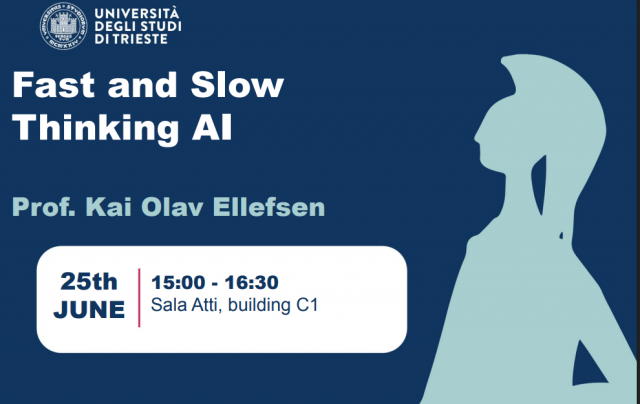Seminar: "Fast and Slow Thinking AI" 25th june 15:00 - 16:30 Sala Atti, building C1
Tipologia news:
home
Dual Process Theory proposes that humans have two modes of reasoning. A fast, instinctive mode (often called System 1), which is active for instance when we quickly respond to dangers, or when we perform routine tasks; and a slow mode (often called System 2), characterized by deep reasoning and focused attention - which is active when we face new challenges or solve hard problems. Most Deep Learning systems are similar to System 1: They operate quickly, detecting patterns in inputs that are similar to what was present in their training data - a process similar to a human "instinct". In the project PIRC (Predictive and Intuitive Robot Companion) at the University of Oslo, we do research on how to perform System 2-style reasoning in robots and AI agents, and on how to implement meta-reasoning: the process of selecting between the two reasoning modes to ensure rapid, "instinctive" response when possible, and deep reasoning when required. (See also https://www.uio.no/ritmo/english/projects/pirc/)
Speaker's short bio:
Kai Olav Ellefsen received the M.Sc. and Ph.D. degrees in computer science from the Norwegian University of Science and Technology, Trondheim, Norway, in 2010 and 2014, respectively. During his Ph.D. studies, he was also a Visiting Researcher with the University of Wyoming, Laramie, WY, USA, for six months, in 2013. He worked as a Postdoctoral Researcher with the Brazilian Institute of Robotics, Salvador, Brazil, from 2014 to 2016; and a Postdoctoral Researcher with the University of Oslo, Oslo, Norway, from 2016 to 2019. Since 2019, he has been an Associate Professor with the Department of Informatics, University of Oslo. His research interests include many topics in the intersection between Artificial Intelligence and robotics, including evolutionary robotics, reinforcement learning, and brain-inspired learning mechanisms.
Host:
Prof. Eric Medvet

Ultimo aggiornamento: 09-06-2025 - 15:44



